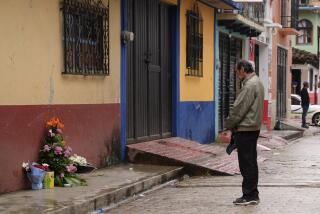Mexico OKs Key Rebel Demand : Latin America: President Zedillo agrees to accept the panel headed by controversial bishop as mediator. Fasting cleric hails move as a ‘star of peace’ on Chiapas horizon.
- Share via
MEXICO CITY — In a Christmas Eve announcement that analysts called a potential breakthrough toward a peaceful settlement to the conflict in Chiapas, President Ernesto Zedillo’s government made a major concession Saturday to the rebels in Mexico’s southernmost state, the Zapatista National Liberation Army.
Zedillo’s Cabinet said it would accept a commission headed by a controversial Roman Catholic bishop, Samuel Ruiz of San Cristobal de las Casas, to be the official mediator between the government and the rebels.
Designating the National Intermediation Commission as chief negotiator was among the key demands of Zapatista leader Subcommander Marcos when he launched a renewed insurrection against the government last week.
With the Mexican army and the armed Indian insurgents at a standoff in the jungles of Chiapas, the uprising has wreaked havoc on the Mexican economy and spread uncertainty nationwide.
There was no immediate reaction to the announcement from Marcos, who remains in the rebels’ remote stronghold within a rain forest near the Guatemalan border. But Ruiz, a rebel sympathizer who has been on a hunger strike since the Zapatistas’ second major mobilization began seven days ago, underscored the importance of the government’s decision.
“The star of peace has appeared on the horizon in Chiapas,” the tired and weakened 70-year-old declared as he met with a key deputy of Zedillo’s interior secretariat at his cathedral Saturday.
Also at the meeting with Deputy Secretary Beatriz Peredes was Chiapas opposition leader Amado Avendano, a former gubernatorial candidate who heads a parallel, self-declared “Government in Rebellion” in the state.
It remained unclear after the meeting whether Ruiz himself would be permitted to negotiate or whether his ecumenical commission would designate another member to attempt to renew contacts with the Zapatistas.
Talking to reporters before the Saturday meeting, though, the bishop seemed to indicate that recognizing his commission as mediator was breakthrough enough.
“I cannot hide the happiness that we have for this news of the day,” he said. “I assume we would be able to re-establish contact immediately with both parties.”
The initial decision by Interior Secretary Esteban Moctezuma Barragan late Friday night to accept Ruiz’s commission as chief negotiator with the Zapatistas was not likely to have been easy.
The bishop is seen by many as a Zapatista partisan. He has expressed support for the rebels’ demands but condemned their use of violence after they launched a New Year’s Day shooting war with the Mexican army to support their demand for equal treatment for indigenous Mexicans, constitutional and democratic reforms, and an end to rule by the rich. At least 145 people died in 12 days of fighting nearly a year ago.
*
When the Zapatista fighters remobilized during a one-day insurrection in the northern part of the state last Monday, they rekindled fears of more violence to come. Those fears triggered an economic panic that ultimately led the government to take the drastic measure of devaluing the peso by more than 20% in a single day.
Publicly conceding for the first time that the Mexican nation is in political and economic crisis, Zedillo indicated to reporters Friday that all sectors of Mexican society need to make deep concessions to defuse the crisis.
The same day, the state interior secretary of Chiapas, Eraclio Zepeda Ramos, conceded, “The danger of war is present (in the state).”
“We are living through a crisis, and we must accept it as such,” the president said during a brief chat with the press in Mexico City just 23 days into his six-year term. “The year 1995 will be a very complicated one. We must aim to try to overcome this economic and political crisis.”
Although the president has stood fast behind a unilateral cease-fire with the rebels and a commitment to negotiate with them, he had proposed a seven-member legislative peace commission to resolve the conflict. The commission included five opposition members, but not Ruiz or his commission.
Speaking to federal legislators Thursday night, Zedillo appeared to back off from his original proposal. He told a congressional committee that either Interior Secretary Moctezuma, one of his most trusted aides and a young, progressive member of his Cabinet, or one of Moctezuma’s deputies, would represent the government in any peace talks with the rebel leader.
Marcos, who declared an end to the 11-month truce with the army after Chiapas’ ruling party governor, Eduardo Robledo Rincon, was inaugurated amid allegations of election fraud on Dec. 1, flatly rejected Zedillo’s proposed commission a week ago.
*
During a jungle press conference called to announce the Zapatista mobilization early Monday morning, Marcos issued two key demands for reopening peace talks. The first was that Bishop Ruiz mediate in the talks. The second was that Robledo resign, which the governor has promised to do if the Zapatistas lay down their weapons.
There was widespread speculation in Chiapas on Saturday after Deputy Secretary Peredes met with Ruiz and Avendano, Robledo’s chief opponent in last August’s gubernatorial election, that the government was considering addressing the rebels’ second demand as well. But Peredes, who emerged from the meeting with a broad smile, gave no other indication of the meeting’s outcome.
More to Read
Sign up for Essential California
The most important California stories and recommendations in your inbox every morning.
You may occasionally receive promotional content from the Los Angeles Times.










